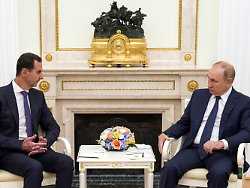Security expert compares
What Putin has in common with Assad
3/8/2022 4:27 am
Surrounded by yes-men, living in your very own reality: security expert Ulrich Schlie compares Vladimir Putin’s situation with that of Syrian head of state Bashar al-Assad. The Russian would have made a similar mistake – and was driven by a special fear.
The Bonn security expert Ulrich Schlie compared the situation of Russian President Vladimir with that of Syrian President Bashar al-Assad. Putin could not go back in the Ukraine war, “and that meant that he got completely lost,” Schlie told the “Kölnische/Bonner Rundschau”.
This raises the question for the international community of how to get out of this situation, said Schlie, who, after working as a diplomat and top civil servant, now teaches as a Henry Kissinger Professor of Security Policy in Bonn: “Is it even conceivable that after return to the negotiating table after this flagrant breach of international law. I see a certain parallel here with the case of the Syrian dictator Bashar al-Assad.”
Putin has burned all bridges, said Schlie. His threats to NATO countries should be taken seriously: “But they are largely aimed at influencing public opinion here in the West too. I can’t imagine him going beyond the major strategic military challenge in Ukraine will seek another conflict.” He could decide a battle for Kyiv in his favor because of the equipment in his armed forces. “He will only pay a horrible price for it.”
Putin is surrounded by yes-men and lives in his own reality, Schlie said. It shows clear changes, “clear changes that we can observe again and again when power is exercised over a very long period of time, and this is especially true when absolute power is exercised”. You can see that in Putin’s language, his demeanor and his facial expressions.
Schlie sees a key reason for the aggressive course that Putin first presented at the Munich Security Conference in 2007 in the experience of the Orange Revolution in Ukraine in 2004: “It’s the fear of democracy, of democratization and the associated consequences for his own exercise of power that drives Putin.”
